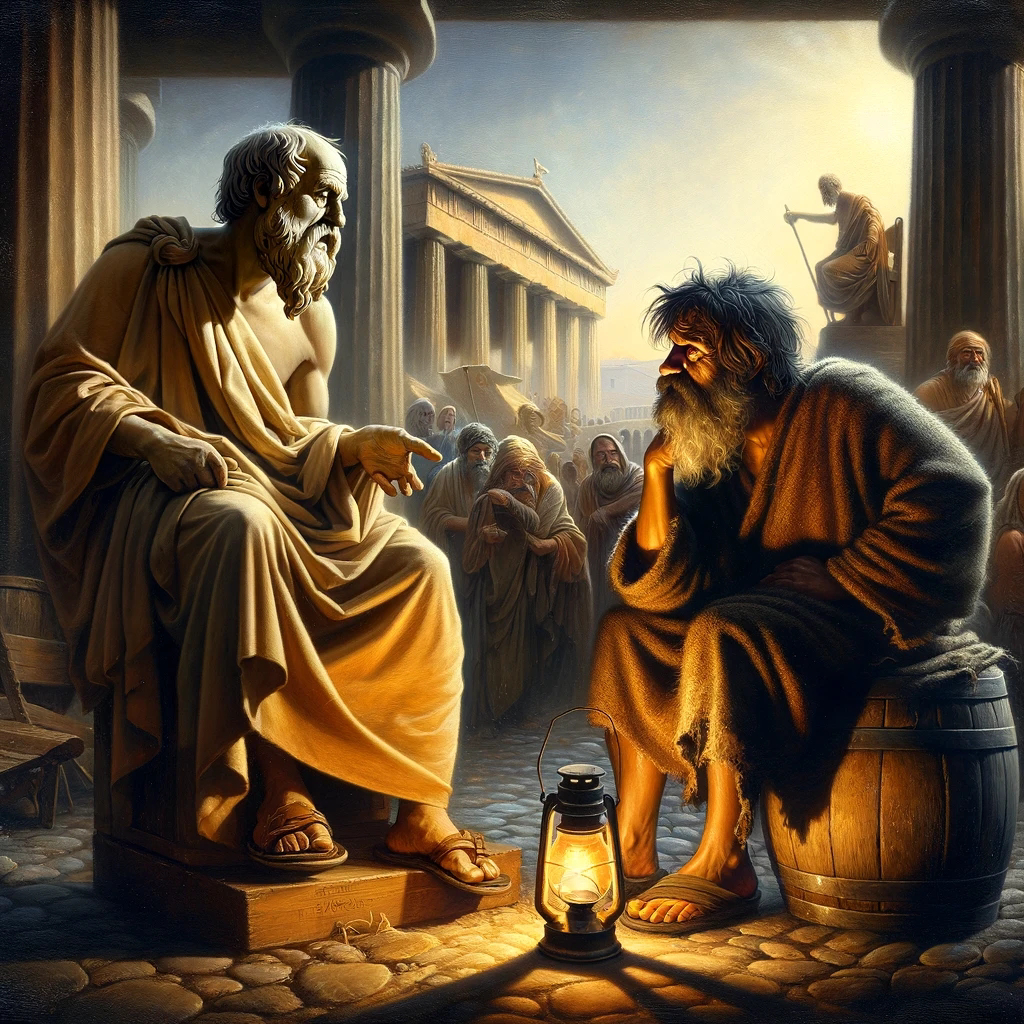Socrates is often considered the grandfather of Western philosophy—a man so committed to truth that he willingly drank poison rather than compromise his principles. But what if I told you that Socrates, for all his wisdom, was just the warm-up act? Enter the Cynics: a group of philosophers who took his ideas and turned them up to eleven, rejecting not just falsehoods but society itself.
The story of Socrates and the Cynics is the story of philosophy at its most raw—where intellect meets rebellion, where wisdom isn’t just discussed but lived. Let’s dive in.
Socrates: The Relentless Questioner
Socrates never wrote anything down. What we know of him comes from his students, particularly Plato and Xenophon. And according to them, Socrates wasn’t interested in grand theories or complex systems—he just wanted to know the truth.
He did this through relentless questioning. The Socratic method, as we now call it, was simple but devastating:
- Ask someone a question about something they claim to know.
- Break their answer apart with further questions.
- Keep going until either they admit ignorance or arrive at a more refined truth.
This process didn’t make him many friends. In fact, it made him powerful enemies—especially among politicians and sophists (those paid to teach rhetoric, often more concerned with persuasion than truth). He was ultimately put on trial for corrupting the youth and impiety, and in 399 BCE, he was sentenced to death. He could have escaped but refused. To him, living dishonestly wasn’t living at all.
Socrates’ commitment to truth inspired countless philosophers. But one group—radical, uncompromising, and a little bit wild—took his ideas further than he ever did.
The Birth of Cynicism: Enter Antisthenes
Antisthenes was one of Socrates’ students, and if anyone truly absorbed his master’s teachings, it was him. But he had a different interpretation.
Where Plato went on to construct intricate metaphysical theories, Antisthenes went in the opposite direction: he rejected all conventional knowledge that didn’t serve virtue. He believed wisdom was not just about knowing but about living correctly, and that meant rejecting the artificial comforts of society.
For Antisthenes, the good life was one of self-sufficiency (autarkeia), virtue, and total indifference to material wealth, social status, and popular opinion. He saw virtue as action, not contemplation. The less one depended on society, the freer they were.
This philosophy became what we now call Cynicism (from kynos, meaning “dog” in Greek—a reference to their rejection of social norms, like dogs living in the streets).
But while Antisthenes laid the foundation, it was Diogenes who became Cynicism.
Diogenes: The Ultimate Cynic
If Socrates was radical for questioning authority, Diogenes was radical for mocking it.
Diogenes took Cynicism to its extreme, rejecting all societal conventions. He lived in a barrel (probably more of a large jar), owned almost nothing, and publicly ridiculed anything he saw as foolish—including Alexander the Great.
There are countless stories of Diogenes’ defiance, but a few stand out:
- When Plato defined humans as “featherless bipeds,” Diogenes plucked a chicken, held it up, and declared, “Behold! A man!”
- When Alexander the Great met him and offered to grant him any wish, Diogenes replied, “Stand out of my sunlight.”
- He would eat, sleep, and relieve himself in public to demonstrate that human nature should not be restrained by arbitrary social conventions.
To Diogenes, happiness and freedom came from living naturally, without shame or dependence on luxuries. If society found that offensive, then society was the problem.
Cynicism as Socratic Philosophy in Action
At first glance, Socrates and the Cynics might seem vastly different. Socrates engaged in deep philosophical discussions, while Diogenes was a performance artist of defiance. But their core principles aligned:
- Truth Over Conformity – Socrates questioned beliefs to expose contradictions, while the Cynics rejected artificiality altogether. Both saw truth as more important than social approval.
- Virtue as the Only Good – For Socrates, virtue was tied to knowledge; for the Cynics, it was about self-sufficiency and rejecting excess. Either way, material wealth and status meant nothing.
- The Examined Life – Socrates famously declared, “The unexamined life is not worth living.” The Cynics took this to mean one should strip life down to its essentials.
Where they differed was in their method. Socrates operated within the city, engaging with its people. The Cynics rejected city life altogether, living like outcasts.
Why Cynicism Still Matters
At its peak, Cynicism was more than just a quirky way of life—it was a philosophical rebellion. It challenged the idea that success meant wealth, that happiness required luxury, or that respectability was tied to social approval.
It’s easy to see why Cynicism remains relevant today. In an era of consumerism, social media posturing, and endless pursuit of status, Diogenes’ radical authenticity is almost refreshing.
That doesn’t mean we should all start living in barrels and rejecting modern conveniences. But there’s something to be learned from the Cynics:
- Happiness isn’t in possessions. It’s in self-sufficiency.
- Freedom comes from needing less. The less you rely on approval or material things, the freer you are.
- Social norms are often arbitrary. Just because something is widely accepted doesn’t make it right.
If Socrates teaches us to question the world, the Cynics teach us to reject its falsehoods entirely.
Final Thoughts: Socrates and the Cynics as Philosophical Outlaws
Socrates and the Cynics didn’t care about fitting in—they cared about truth. One sought it through dialogue, the other through radical independence. Both were willing to die for their beliefs.
While history tends to favor Socrates as the wise martyr and Diogenes as the eccentric rebel, both were essential to the evolution of philosophy. Socrates laid the intellectual foundation, and the Cynics lived the philosophy.
In the end, they ask us the same question: Are you living according to truth, or just according to what society expects?




